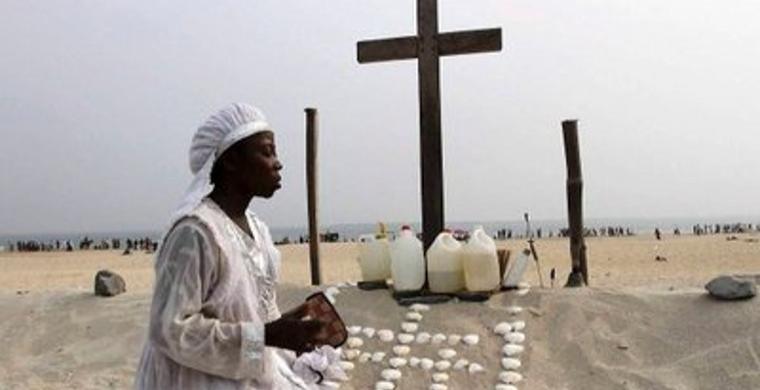CHURCH OF NIGERIA AND THE KILLING FIELDS
The Church of Nigeria, Anglican Communion, like many denominations in the northern states, is facing persecution.
By Hassan John
https://www.e-n.org.uk/2018/06/world-news/church-of-nigeria-and-the-killing-fields/
May 27, 2018
The radical Islamic terrorist group, Jama'atu Ahlis-Sunna Lidda'Awati Wal-Jihad (People Committed to the Prophet's Teachings for Propagation and Jihad), has focused its attacks on Christians and their churches, businesses or communities since 2010, making Nigeria the 14th most dangerous country for Christians in the world.
The group then graduated to attacking anything it perceives as immoral against Islam, particularly Western education, exemplified in schools and in democratic governance. This earned it the name Boko Haram, meaning 'Western education is un-Islamic and prohibited'.
Thousands killed
Boko Haram has killed well over 20,000 people according to the 2016 UN records. '14.8 million Nigerians from Northeast are directly impacted by the crisis. Officially, there are 2.2 million Internally Displaced Persons (IDPs),' a report says, but unofficial records put the figures at around 7 million. 14 million people in the region have been impacted by the radical Islamic terror group's insurgency.
The Jos Province, Anglican Communion, consisting of ten states of the north eastern region, has suffered the most in the country. Over 13,000 churches have been destroyed by Boko Haram in the northeast. Bishop Emmanuel Morris of Maiduguri Diocese said that in Borno State only four churches within Maiduguri town, of the hundreds of churches in the region, are still functional. Thousands of Christians have been displaced.
This challenge is further complicated by the continuing attacks by Islamist Fulani cattle herdsmen, named as 'fourth deadliest known terrorist group' in the world, who have targeted the predominantly Christian middle-belt region of the country. Hundreds of villages have been destroyed and thousands of people killed since 2014.
Government criticism
The inability of the Nigerian government to stop the killings has raised a lot of criticism and debates about the government's commitment to stopping the massacres. These allegations include: corruption; Islamisation agenda; military complacency; and involvement to perpetuate the crisis for profit and for political benefits by politicians.
There is a growing disillusionment with President Buhari's handling of the protracted killings in addition to the economic hardship in the country. Buhari's meeting with the Archbishop of Canterbury prompted protest in London, and the visit was condemned and criticised by Christian groups in Nigeria.
The presidency announced that it had received an endorsement by Archbishop Justin Welby, and quoted him as saying: 'You have my best wishes on your recent decision (to re-recontest). I read your declaration speech. We are neutral as a church, but we will pray for you. Great statesmen are those who run for the good of their country.'
Former Minister of Aviation, Femi Fani-Kayode, in a sharp criticism, wondered: 'Has the blood of the Christian martyrs and saints that has been shed over the last three years in Nigeria not moved or touched the heart of this so-called Archbishop?'
Selective quotes
Other media reports, however, felt that the government was simply grasping for cheap publicity and pointed out what was omitted by the government in Welby's statement. 'I expressed deep concern about the suffering resulting from raids on Christian communities and villages as far south as Delta State. We discussed the causes of such depredations, which have led to very many deaths and threaten an escalation of violence. I urged measures to restore confidence in the neutrality of the state, and spoke of the suffering of the poor in such tragedies,' the reports said.
The Church of Nigeria, in a quagmire on how to respond to the killings, seems torn between the Nigerian government's claims of Boko Haram's defeat, against the continuing attacks by the Islamists, as seen in the kidnap of the Dapchi schoolgirls, the periodic suicide bombings and the continuous killings and destruction of predominant Christian communities. A few Christian leaders who raised their voices against the killings faced arrests or sharp criticism.
Leah Sharibu, the only girl held back by Boko Haram because she is a Christian among the 110 kidnapped and later released, raised a lot of questions within the Christian community. Over 100 Chibok school girls, most of whom are Christians, are still unaccounted for. This comes amidst reports that only about 30 of the girls, some who have 'converted to Islam', are still alive and the recent targeting and killing of two Catholic priests and 13 worshippers in Benue.
Experts fear that the seeming inability of the Church to speak to the political powers is giving rise to anarchy, as communities are arming to defend themselves.
This article was first published in the June Issue Evangelicals Now
The Rev. Hassan John, Archdeacon of Jos, Church of Nigeria of the Anglican Communion














